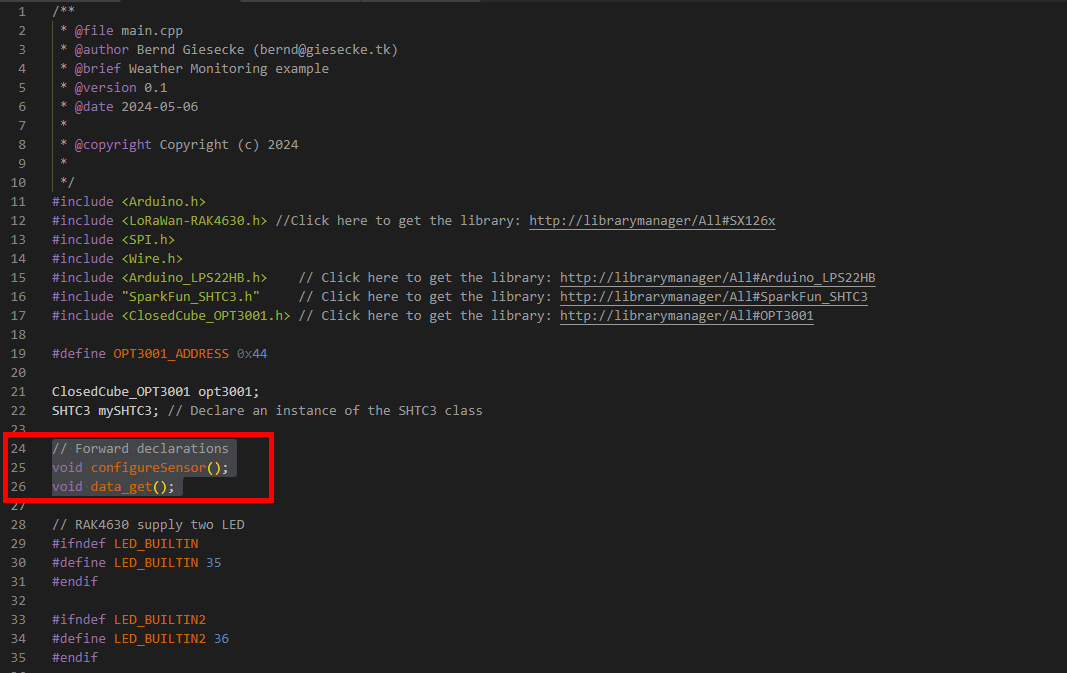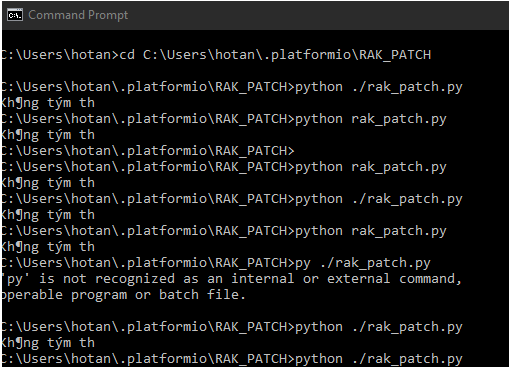/**
- @file Weather_Monitoring.ino
- @author rakwireless.com
- @brief This sketch demonstrate reading a data from a weather station
- and send the data to lora gateway.
- @version 0.1
- @date 2020-07-28
- @copyright Copyright (c) 2020
- @note RAK4631 GPIO mapping to nRF52840 GPIO ports
RAK4631 ↔ nRF52840
WB_IO1 ↔ P0.17 (GPIO 17)
WB_IO2 ↔ P1.02 (GPIO 34)
WB_IO3 ↔ P0.21 (GPIO 21)
WB_IO4 ↔ P0.04 (GPIO 4)
WB_IO5 ↔ P0.09 (GPIO 9)
WB_IO6 ↔ P0.10 (GPIO 10)
WB_SW1 ↔ P0.01 (GPIO 1)
WB_A0 ↔ P0.04/AIN2 (AnalogIn A2)
WB_A1 ↔ P0.31/AIN7 (AnalogIn A7)
*/
#include <Commissioning.h>
#include <Adafruit_TinyUSB.h>
#include <Arduino.h>
#include <LoRaWan-RAK4630.h> //Click here to get the library: http://librarymanager/All#SX126x
#include <SPI.h>
#include <Wire.h>
#include <Arduino_LPS22HB.h> // Click here to get the library: http://librarymanager/All#Arduino_LPS22HB
#include “SparkFun_SHTC3.h” // Click here to get the library: http://librarymanager/All#SparkFun_SHTC3
#include <ClosedCube_OPT3001.h> // Click here to get the library: http://librarymanager/All#OPT3001
#define OPT3001_ADDRESS 0x44
ClosedCube_OPT3001 opt3001;
SHTC3 mySHTC3; // Declare an instance of the SHTC3 class
// Forward declarations
void configureSensor();
void data_get();
// RAK4630 supply two LED
#ifndef LED_BUILTIN
#define LED_BUILTIN 35
#endif
#ifndef LED_BUILTIN2
#define LED_BUILTIN2 36
#endif
bool doOTAA = true; // OTAA is used by default.
#define SCHED_MAX_EVENT_DATA_SIZE APP_TIMER_SCHED_EVENT_DATA_SIZE /< Maximum size of scheduler events. */
#define SCHED_QUEUE_SIZE 60 /< Maximum number of events in the scheduler queue. /
#define LORAWAN_DATERATE DR_0 /LoRaMac datarates definition, from DR_0 to DR_5/
#define LORAWAN_TX_POWER TX_POWER_5 /LoRaMac tx power definition, from TX_POWER_0 to TX_POWER_15/
#define JOINREQ_NBTRIALS 3 /**< Number of trials for the join request. /
DeviceClass_t g_CurrentClass = CLASS_A; / class definition/
LoRaMacRegion_t g_CurrentRegion = LORAMAC_REGION_EU868; /* Region:EU868*/
lmh_confirm gCurrentConfirm = LMH_UNCONFIRMED_MSG; /* confirm/unconfirm packet definition*/
uint8_t gAppPort = LORAWAN_APP_PORT; /* data port*/
/**@brief Structure containing LoRaWan parameters, needed for lmh_init()
*/
static lmh_param_t g_lora_param_init = {LORAWAN_ADR_ON, LORAWAN_DATERATE, LORAWAN_PUBLIC_NETWORK, JOINREQ_NBTRIALS, LORAWAN_TX_POWER, LORAWAN_DUTYCYCLE_OFF};
// Foward declaration
static void lorawan_has_joined_handler(void);
static void lorawan_join_failed_handler(void);
static void lorawan_rx_handler(lmh_app_data_t *app_data);
static void lorawan_confirm_class_handler(DeviceClass_t Class);
static void send_lora_frame(void);
/**@brief Structure containing LoRaWan callback functions, needed for lmh_init()
*/
static lmh_callback_t g_lora_callbacks = {BoardGetBatteryLevel, BoardGetUniqueId, BoardGetRandomSeed,
lorawan_rx_handler, lorawan_has_joined_handler, lorawan_confirm_class_handler, lorawan_join_failed_handler
};
//OTAA keys !!! KEYS ARE MSB !!!
uint8_t nodeDeviceEUI[8] = {0x88, 0x88, 0x88, 0x88, 0x88, 0x88, 0x33, 0x33};
uint8_t nodeAppEUI[8] = {0xB8, 0x27, 0xEB, 0xFF, 0xFE, 0x39, 0x00, 0x00};
uint8_t nodeAppKey[16] = {0x88, 0x88, 0x88, 0x88, 0x88, 0x88, 0x88, 0x88, 0x88, 0x88, 0x88, 0x88, 0x88, 0x88, 0x88, 0x88};
// ABP keys
uint32_t nodeDevAddr = 0x260116F8;
uint8_t nodeNwsKey[16] = {0x7E, 0xAC, 0xE2, 0x55, 0xB8, 0xA5, 0xE2, 0x69, 0x91, 0x51, 0x96, 0x06, 0x47, 0x56, 0x9D, 0x23};
uint8_t nodeAppsKey[16] = {0xFB, 0xAC, 0xB6, 0x47, 0xF3, 0x58, 0x45, 0xC7, 0x50, 0x7D, 0xBF, 0x16, 0x8B, 0xA8, 0xC1, 0x7C};
// Private defination
#define LORAWAN_APP_DATA_BUFF_SIZE 64 /< buffer size of the data to be transmitted. */
#define LORAWAN_APP_INTERVAL 20000 /< Defines for user timer, the application data transmission interval. 20s, value in [ms]. */
static uint8_t m_lora_app_data_buffer[LORAWAN_APP_DATA_BUFF_SIZE]; //< Lora user application data buffer.
static lmh_app_data_t m_lora_app_data = {m_lora_app_data_buffer, 0, 0, 0, 0}; //< Lora user application data structure.
TimerEvent_t appTimer;
static uint32_t timers_init(void);
static uint32_t count = 0;
static uint32_t count_fail = 0;
void setup()
{
pinMode(LED_BUILTIN, OUTPUT);
digitalWrite(LED_BUILTIN, LOW);
// Initialize Serial for debug output
time_t timeout = millis();
Serial.begin(115200);
while (!Serial)
{
if ((millis() - timeout) < 5000)
{
delay(100);
}
else
{
break;
}
}
// Initialize LoRa chip.
lora_rak4630_init();
Serial.println(“=====================================”);
Serial.println(“Welcome to RAK4630 LoRaWan!!!”);
if (doOTAA)
{
Serial.println(“Type: OTAA”);
}
else
{
Serial.println(“Type: ABP”);
}
switch (g_CurrentRegion)
{
case LORAMAC_REGION_AS923:
Serial.println(“Region: AS923”);
break;
case LORAMAC_REGION_AU915:
Serial.println(“Region: AU915”);
break;
case LORAMAC_REGION_CN470:
Serial.println(“Region: CN470”);
break;
case LORAMAC_REGION_CN779:
Serial.println(“Region: CN779”);
break;
case LORAMAC_REGION_EU433:
Serial.println(“Region: EU433”);
break;
case LORAMAC_REGION_IN865:
Serial.println(“Region: IN865”);
break;
case LORAMAC_REGION_EU868:
Serial.println(“Region: EU868”);
break;
case LORAMAC_REGION_KR920:
Serial.println(“Region: KR920”);
break;
case LORAMAC_REGION_US915:
Serial.println(“Region: US915”);
break;
case LORAMAC_REGION_RU864:
Serial.println(“Region: RU864”);
break;
case LORAMAC_REGION_AS923_2:
Serial.println(“Region: AS923-2”);
break;
case LORAMAC_REGION_AS923_3:
Serial.println(“Region: AS923-3”);
break;
case LORAMAC_REGION_AS923_4:
Serial.println(“Region: AS923-4”);
break;
}
Serial.println(“=====================================”);
Wire.begin();
/* shtc3 init */
Serial.println(“shtc3 init”);
Serial.print("Beginning sensor. Result = "); // Most SHTC3 functions return a variable of the type “SHTC3_Status_TypeDef” to indicate the status of their execution
mySHTC3.begin(); // To start the sensor you must call “begin()”, the default settings use Wire (default Arduino I2C port)
Wire.setClock(400000); // The sensor is listed to work up to 1 MHz I2C speed, but the I2C clock speed is global for all sensors on that bus so using 400kHz or 100kHz is recommended
Serial.println();
if (mySHTC3.passIDcrc) // Whenever data is received the associated checksum is calculated and verified so you can be sure the data is true
{ // The checksum pass indicators are: passIDcrc, passRHcrc, and passTcrc for the ID, RH, and T readings respectively
Serial.print("ID Passed Checksum. ");
Serial.print(“Device ID: 0b”);
Serial.println(mySHTC3.ID, BIN); // The 16-bit device ID can be accessed as a member variable of the object
}
else
{
Serial.println("ID Checksum Failed. ");
}
/* LPS22HB init /
if (!BARO.begin())
{
Serial.println(“Failed to initialize pressure sensor!”);
while (1)
;
}
/ opt3001 init */
opt3001.begin(OPT3001_ADDRESS);
Serial.print(“OPT3001 Manufacturer ID”);
Serial.println(opt3001.readManufacturerID());
Serial.print(“OPT3001 Device ID”);
Serial.println(opt3001.readDeviceID());
configureSensor();
// Initialize Scheduler and timer
uint32_t err_code;
err_code = timers_init();
if (err_code != 0)
{
Serial.printf(“timers_init failed - %d\n”, err_code);
return;
}
// Setup the EUIs and Keys
if (doOTAA)
{
lmh_setDevEui(nodeDeviceEUI);
lmh_setAppEui(nodeAppEUI);
lmh_setAppKey(nodeAppKey);
}
else
{
lmh_setNwkSKey(nodeNwsKey);
lmh_setAppSKey(nodeAppsKey);
lmh_setDevAddr(nodeDevAddr);
}
// Initialize LoRaWan
err_code = lmh_init(&g_lora_callbacks, g_lora_param_init, doOTAA, g_CurrentClass, g_CurrentRegion);
if (err_code != 0)
{
Serial.printf(“lmh_init failed - %d\n”, err_code);
return;
}
// Start Join procedure
lmh_join();
}
void loop()
{
// Put your application tasks here, like reading of sensors,
// Controlling actuators and/or other functions.
}
/@brief LoRa function for handling HasJoined event.
*/
void lorawan_has_joined_handler(void)
{
if(doOTAA == true)
{
Serial.println(“OTAA Mode, Network Joined!”);
}
else
{
Serial.println(“ABP Mode”);
}
lmh_error_status ret = lmh_class_request(g_CurrentClass);
if (ret == LMH_SUCCESS)
{
delay(1000);
TimerSetValue(&appTimer, LORAWAN_APP_INTERVAL);
TimerStart(&appTimer);
}
}
/@brief LoRa function for handling OTAA join failed
*/
static void lorawan_join_failed_handler(void)
{
Serial.println(“OTAA join failed!”);
Serial.println(“Check your EUI’s and Keys’s!”);
Serial.println(“Check if a Gateway is in range!”);
}
/**@brief Function for handling LoRaWan received data from Gateway
*
- @param[in] app_data Pointer to rx data
*/
void lorawan_rx_handler(lmh_app_data_t *app_data)
{
Serial.printf(“LoRa Packet received on port %d, size:%d, rssi:%d, snr:%d, data:%s\n”,
app_data->port, app_data->buffsize, app_data->rssi, app_data->snr, app_data->buffer);
}
void lorawan_confirm_class_handler(DeviceClass_t Class)
{
Serial.printf(“switch to class %c done\n”, “ABC”[Class]);
// Informs the server that switch has occurred ASAP
m_lora_app_data.buffsize = 0;
m_lora_app_data.port = gAppPort;
lmh_send(&m_lora_app_data, gCurrentConfirm);
}
void send_lora_frame(void)
{
if (lmh_join_status_get() != LMH_SET)
{
//Not joined, try again later
return;
}
data_get();
lmh_error_status error = lmh_send(&m_lora_app_data, gCurrentConfirm);
if (error == LMH_SUCCESS)
{
count++;
Serial.printf(“lmh_send ok count %d\n”, count);
}
else
{
count_fail++;
Serial.printf(“lmh_send fail count %d\n”, count_fail);
}
}
/**@brief Function for handling user timerout event.
*/
void tx_lora_periodic_handler(void)
{
TimerSetValue(&appTimer, LORAWAN_APP_INTERVAL);
TimerStart(&appTimer);
Serial.println(“Sending frame now…”);
send_lora_frame();
}
/**@brief Function for the Timer initialization.
*
- @details Initializes the timer module. This creates and starts application timers.
*/
uint32_t timers_init(void)
{
TimerInit(&appTimer, tx_lora_periodic_handler);
return 0;
}
String data = “”;
void data_get()
{
Serial.print("result: ");
uint32_t i = 0;
memset(m_lora_app_data.buffer, 0, LORAWAN_APP_DATA_BUFF_SIZE);
m_lora_app_data.port = gAppPort;
mySHTC3.update();
float temp = mySHTC3.toDegC();
float hum = mySHTC3.toPercent();
float pres = BARO.readPressure();
OPT3001 result = opt3001.readResult();
data = “Tem:” + String(temp) + "C " + “Hum:” + String(hum) + "% " + “Pres:” + String(pres) + "KPa " + “Lig:” + String(result.lux) + “lux”;
Serial.println(data);
uint16_t t = temp * 100;
uint16_t h = hum * 100;
uint32_t pre = pres * 100;
uint16_t l = result.lux * 100;
//result: T=28.25C, RH=50.00%, P=958.57hPa, light=100.46 lux
m_lora_app_data.buffer[i++] = 0x02;
m_lora_app_data.buffer[i++] = (uint8_t)(t >> 8);
m_lora_app_data.buffer[i++] = (uint8_t)t;
m_lora_app_data.buffer[i++] = (uint8_t)(h >> 8);
m_lora_app_data.buffer[i++] = (uint8_t)h;
m_lora_app_data.buffer[i++] = (uint8_t)((pre & 0xFF000000) >> 24);
m_lora_app_data.buffer[i++] = (uint8_t)((pre & 0x00FF0000) >> 16);
m_lora_app_data.buffer[i++] = (uint8_t)((pre & 0x0000FF00) >> 8);
m_lora_app_data.buffer[i++] = (uint8_t)(pre & 0x000000FF);
m_lora_app_data.buffer[i++] = (uint8_t)(l >> 8);
m_lora_app_data.buffer[i++] = (uint8_t)l;
m_lora_app_data.buffsize = i;
}
void configureSensor()
{
OPT3001_Config newConfig;
newConfig.RangeNumber = B1100;
newConfig.ConvertionTime = B0;
newConfig.Latch = B1;
newConfig.ModeOfConversionOperation = B11;
OPT3001_ErrorCode errorConfig = opt3001.writeConfig(newConfig);
if (errorConfig != NO_ERROR)
{
} //printError(“OPT3001 configuration”, errorConfig);
else
{
OPT3001_Config sensorConfig = opt3001.readConfig();
Serial.println(“OPT3001 Current Config:”);
Serial.println(“------------------------------”);
Serial.print("Conversion ready (R):");
Serial.println(sensorConfig.ConversionReady, HEX);
Serial.print("Conversion time (R/W):");
Serial.println(sensorConfig.ConvertionTime, HEX);
Serial.print("Fault count field (R/W):");
Serial.println(sensorConfig.FaultCount, HEX);
Serial.print("Flag high field (R-only):");
Serial.println(sensorConfig.FlagHigh, HEX);
Serial.print("Flag low field (R-only):");
Serial.println(sensorConfig.FlagLow, HEX);
Serial.print("Latch field (R/W):");
Serial.println(sensorConfig.Latch, HEX);
Serial.print("Mask exponent field (R/W):");
Serial.println(sensorConfig.MaskExponent, HEX);
Serial.print("Mode of conversion operation (R/W):");
Serial.println(sensorConfig.ModeOfConversionOperation, HEX);
Serial.print("Polarity field (R/W):");
Serial.println(sensorConfig.Polarity, HEX);
Serial.print("Overflow flag (R-only):");
Serial.println(sensorConfig.OverflowFlag, HEX);
Serial.print("Range number (R/W):");
Serial.println(sensorConfig.RangeNumber, HEX);
Serial.println("------------------------------");
}
}


